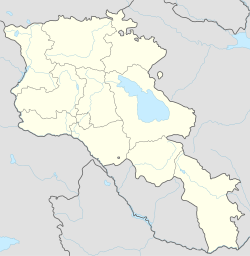Alapars (Armenian: Ալափարս) is a village in the Kotayk Province of Armenia. The village has 860 dwellings, a school, house of culture, and library. The population is entirely Armenian.
Alapars
Ալափարս | |
|---|---|
Village | |
 A view of Alapars | |
| Coordinates: 40°25′17″N 44°38′05″E / 40.42139°N 44.63472°E | |
| Country | |
| Province | Kotayk |
| Founded | 470, resettled in 1828-30 |
| Area | |
| • Total | 32.94 km2 (12.72 sq mi) |
| Elevation | 1,500−1,601 m (−3,753 ft) |
| Population | |
| • Total | 2,076 |
| • Density | 63/km2 (160/sq mi) |
| Time zone | UTC+4 (AMT) |
| Area code | +374 (226) |
| Alapars at GEOnet Names Server | |
Toponymy
editThe village was previously known as Aylaberk and Aylaber.
History
editAlapars was founded in 470, but was resettled in 1828-30 by immigrants from Khoy and Maku. Its center is dominated by the churches of Saint Vartan (Vartanavank) built in 901 (rebuilt 19th century) by a Prince Grigor, and the Holy Mother of God (Surb Astvatsatsin) of 1897. Also in the vicinity is the monastery of S. Tsiranavor. According to local folklore, Vartanavank contains a drop of blood from the Armenian national hero Vartan Mamikonian.[2][3]
Gallery
edit-
The church of Vardanavank built in 901, reconstructed in the 19th century
-
St. Astvatsatsin Church (Holy Mother of God Church), 1897
-
Large khachkar adjacent to Vartanavank
-
Sculpture in Tukh Manuk, Alapars by Avetik Avetyan, words by Avetik Isahakyan
Notable people
edit- Avetik Avetyan, USSR multiple medalist and director of the pump station of Alapars
- Mushegh Aliabertsi, Patriarch (490-561)
- Tatik Saryan, artist
- Melik Kocharyan, dramatist
- Shavigh Grigoryan, folk collector
- Kavalenko Shahgaldyan, Governor of the Kotayk Province
References
edit- ^ Statistical Committee of Armenia. "The results of the 2011 Population Census of Armenia" (PDF).
- ^ "Alapars (Kotayk)". CAA: Union of Communities of Armenia. Archived from the original on June 22, 2015. Retrieved May 30, 2015.
- ^ Kiesling, Brady; Kojian, Raffi (2005). Rediscovering Armenia: Guide (2nd ed.). Yerevan: Matit Graphic Design Studio. p. 95. ISBN 99941-0-121-8.
External links
editWikimedia Commons has media related to Alapars.
- Report of the results of the 2001 Armenian Census, Statistical Committee of Armenia
- Kiesling, Brady (2005), Rediscovering Armenia: Guide, Yerevan, Armenia: Matit Graphic Design Studio
- Kiesling, Brady (June 2000). Rediscovering Armenia: An Archaeological/Touristic Gazetteer and Map Set for the Historical Monuments of Armenia (PDF). Archived (PDF) from the original on 6 November 2021.
